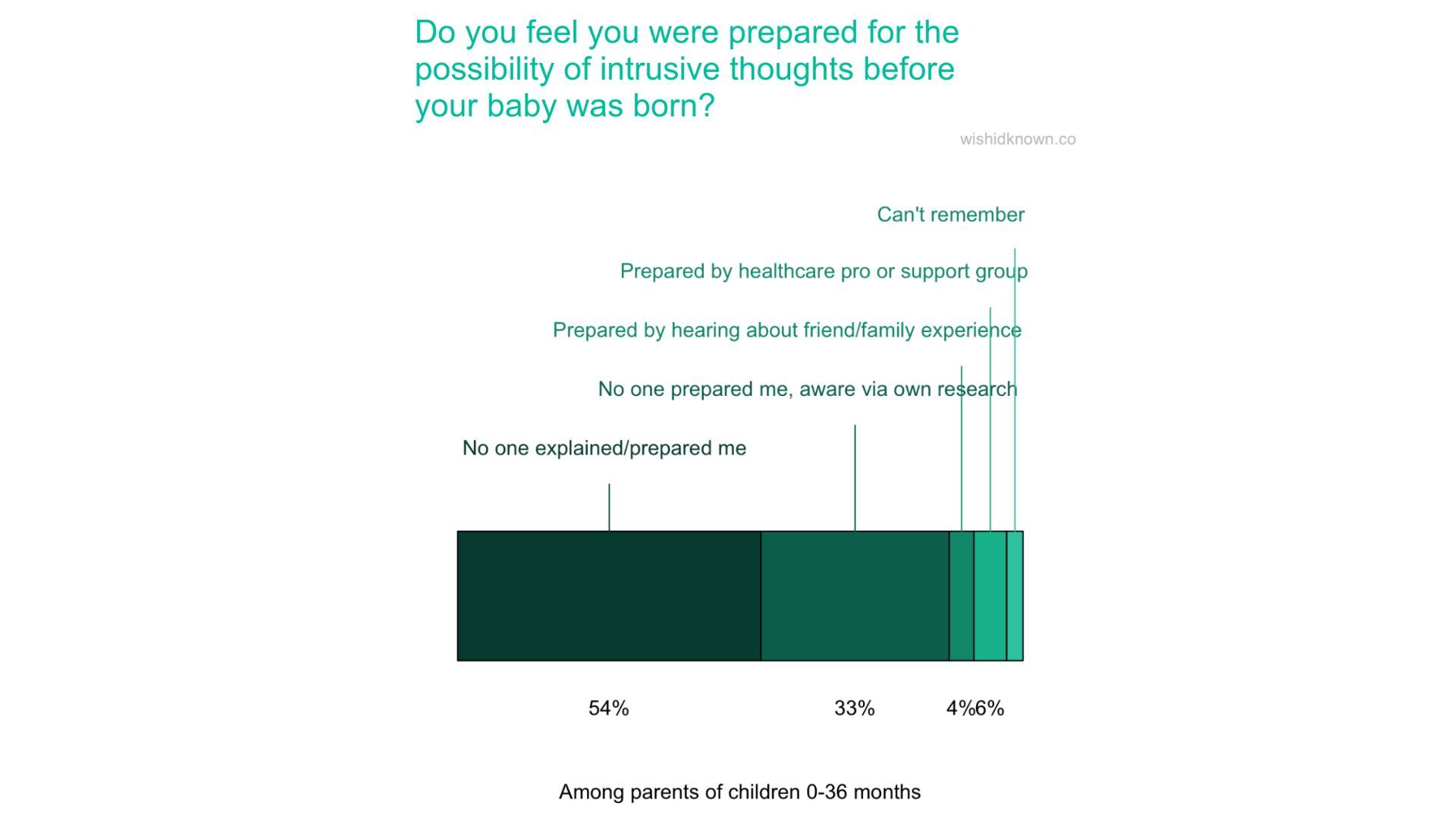Does everyone have intrusive thoughts? Whether you're parenting toddlers or teens we ask the experts for the 5 most common 'uncontrollable' thoughts (and how to live with them)
It’s not just you - the majority of mums have thoughts about harming their child, accidentally or deliberately. We explain why.

Does everyone have intrusive thoughts or is it just you? If you’ve just put your baby down because you’re afraid of dropping them or avoided bathing them because you’re worried about accidental drowning, you’re not alone.
Editor's note
Please note this article does not replace therapy. If you are experiencing unwanted and intrusive thoughts about harming yourself or your baby, seek professional help from your health visitor, GP, or a qualified therapist.
There are a variety of reasons why intrusive thoughts happen in early parenthood. Transitioning to being a mum (matrescence) is a long process and can take a lot of adjusting. Combine that with postnatal depression - which affects at least 10% of all mums - and the mental load you’re now facing, and it’s no wonder that your thoughts can sometimes take a darker turn. India Haylor, Psychotherapist & Clinical Lead at OCD Excellence, says: "Intrusive thoughts after childbirth are nothing to be ashamed of. They range from worries about your baby's safety to irrational fears or catastrophic scenarios. It's important to remember they don’t define you as a parent, and they’re not a reflection of your love for your child.”
While intrusive thoughts and images are incredibly upsetting and can cause you huge distress, it’s vital to remember that they are just thoughts and that you are not going to harm your baby. We explain why they happen, which are the most common, and what you can do about them. Plus, we have expert advice on what to do if you feel you can’t cope with intrusive thoughts.
Why am I having intrusive thoughts?
Becoming a new mum can be thrilling, but it can also be scary. And sometimes, really frightening thoughts pop into our heads out of the blue about our precious baby. Things we would never, ever actually want to happen. More than 7 in 10 new mums report having unwanted and intrusive thoughts about their baby being harmed. And 1 in 2 mums have thoughts about deliberately harming their baby, according to a report published in BMC Psychiatry.
These kinds of unwelcome, disturbing thoughts are what experts call intrusive thoughts. And while they can be upsetting, they're more common than you might think after giving birth, and they definitely don’t mean you’re a ‘bad’ mum.

In fact, anywhere between 70% and 100% of new mums have frightening visions of accidentally harming their babies. And the truth is, no one tells us it will happen. According to the parenting insights website Wish I’d Known, almost 90% of parents aren’t told by a medical professional that intrusive thoughts are a thing, and more than half had never heard of them before becoming a parent. "Research shows that intrusive thoughts can be triggered by the hormonal and psychological changes that occur with motherhood, as your brain adapts to the new responsibilities and anxieties that come with caring for a baby, explains India Haylor, Psychotherapist & Clinical Lead at OCD Excellence.
"I had intrusive thoughts of falling down the stairs while holding him... and it made me feel really anxious."
Grainne
Your body has just been through a rollercoaster of hormone changes during pregnancy and childbirth. In the first few weeks after delivery, estrogen and progesterone take a drastic nosedive. This sudden change influences brain chemicals that regulate mood and can leave you more vulnerable to scary thoughts.
GoodtoKnow Newsletter
Parenting advice, hot topics, best buys and family finance tips delivered straight to your inbox.
Besides hormones, lack of sleep and the huge life change of caring for an infant can strain your coping skills and ramp up stress levels. This can open the door for negative thoughts to barge in. Intrusive thoughts and images can be more common if you have postpartum depression and/or anxiety.
Dr Caroline Boyd, clinical psychologist, author and mother, says new mums feel an overwhelming responsibility to protect their baby from any harm. "You may experience this heightened anxiety in the form of scary, intrusive thoughts," says Boyd. "Such as, 'What if my baby suffocates?' These can feel frightening, horrifying, and, for some, debilitating."
A post shared by Dr Caroline Boyd Clinical Psychologist • Author • Mother (@_drboyd)
A photo posted by on
In other words, most intrusive thoughts are a direct symptom of all the pressures and emotions we face upon becoming a parent. Is it any wonder that our minds stray to strange places when everything else feels so out of our control?
What are the most common intrusive thoughts?
Many new mums experience sudden, uncontrollable thoughts that are deeply disturbing. These can include vivid images of terrible accidents happening to your baby or your partner, or even ideas about hurting yourself.
Common scenarios that often pop into mums' heads against their will include:
- Your baby stops breathing or falls victim to SIDS.
- They slip off the changing table.
- They drown during bath time or get burned by hot water.
- They get flung through the air because you didn't buckle the car seat correctly.
- You drop your baby down the stairs or on hard floors.
"I remember looking at him and thinking, you've ruined my life and my body, what have I done‚ why did I ever think I wanted a baby! Then I would spiral into oh gosh, I love him, how could I feel these horrible things? It was a relentless cycle."
Susie
Others have repeated thoughts about not being a good enough mum. These may sound like:
- What if I can never love this baby?
- What if my baby doesn't love me?
- My family are better off without me.
- I'll end up harming my baby.
As horrific as these vivid visions and thoughts are, they don't mean you are a dangerous mum. They also don't make you a terrible person. They can feel painfully real, but they exist only in your mind.
"The specific fears that you might be focusing on are likely to change as your children get older," writes therapist and mum Kate Borstao on her blog. "For example, maybe when they were a baby, you feared that they would stop breathing in their sleep. Now, you’re scared that your dare-devil nine-year-old will try something risky and fall."
Kate goes on to explain that it's "totally normal to have anxiety during motherhood or to deal with intrusive thoughts. Because you’re a mother to young, vulnerable children, you’re in a heightened state of awareness trying to catch potential threats before something harmful happens to your kids."
Tips to help manage intrusive thoughts - from the experts
“It’s important to recognise that, by nature, intrusive thoughts are not something that can be controlled, but they can become more manageable with certain strategies,” says postpartum therapist Rachel Goldberg.
Here are some tips gathered from our experts to help in the moment when intrusive thoughts strike, and more generally:
- Practise mindfulness or another meditation technique: Goldberg and Haylor suggest using techniques such as mindfulness, grounding exercises or deep breathing to bring you back to the moment instead of getting lost in your thoughts.
- Share your experience: Seek out another mum that you trust to express what you’re experiencing, says Goldberg. Chances are, they’ll have been there too. Talking about those scary thoughts actually does help them feel less real.
- Identify triggers: Goldberg suggests thinking about which scenarios tend to trigger intrusive thoughts so you’re less ambushed by them when they pop up. For example, your mind might wander more at night when you’re exhausted or during marathon breastfeeding sessions. Knowing when the thoughts are more likely to pop up means you can identify them as ‘intrusive’ and not your real thoughts and feelings.
- Practise self-care: Parenting a newborn baby is exhausting, end of. Even if you can’t sleep for more than a few hours or nap in the middle of the day, try to make a little time for something that nourishes you emotionally - a warm bath, an extra long shower, chatting with a friend, or walking in the sunshine.

When should I reach out for help with my intrusive thoughts?
We’ve explained how it’s completely normal to experience many intrusive thoughts about your baby. However, if you’re having repeated and unwelcome intrusive thoughts that affect how you care for your baby, or thoughts that make you feel as if you will harm your baby, or yourself, it’s time to get professional help.
"If sudden changes in behaviour accompany the intrusive thoughts, or the thoughts become highly distressing, constant, or violent, this might be a sign of post partum obsessive-compulsive disorder,” says Haylor. “This can happen in new mums and is generated by hormonal changes and not because of a genuine risk. It is important to reach out for expert help from your GP or a mental health professional, such as an OCD expert.”
Perinatal OCD can affect up to one in five women, according to research. If you had OCD before you became a mum, the likelihood of developing perinatal OCD increases.
The good news is that there are treatments available for perinatal OCD, including talking therapies such as cognitive behavioural therapy (CBT) and exposure and response therapy (ERP), which is a specific type of CBT. Your GP may also offer you medication to treat your symptoms, as well as talking therapies. “Talking to a therapist or joining a support group can also help process these thoughts in a healthy way,” suggests Haylor.
Above all else, the most important thing is not to suffer in silence with intrusive thoughts. “Remember, you are not alone in experiencing these thoughts,” says Haylor. “There is support available to help you navigate this challenging time."
Open up and confide in someone you trust or reach out for professional help. A medical professional or psychologist will not judge you or take your baby away from you. They know that thoughts are just thoughts at the end of the day, and that’s something you’ll learn too.
Our expert panel

Rachel Goldberg is a marriage and family therapist specialising in pregnancy and postpartum anxiety and depression.

India Haylor is the founder and head therapist of OCD Excellence, a practice in Kensington, London, specialising in the treatment of Obsessive Compulsive Disorder.

Dr Caroline Boyd is a Chartered Clinical Psychologist, HCPC registered, with over 10 years’ experience working in the NHS and mental health settings. She specialises in supporting parents perinatally - from pregnancy to childbirth and all aspects of the transition to parenthood.
Get more advice and information on becoming a new parent, from discovering what perinatal mental health is and how to look after yours to natural anxiety remedies that can help you unwind. Plus, how one sentence helped this mum deal with guilt.
Joanne Lewsley is mum to a tween, and freelance copywriter and editor who creates parenting, health and lifestyle content for evidence-based websites, including BabyCentre, Live Science, Medical News Today and more.